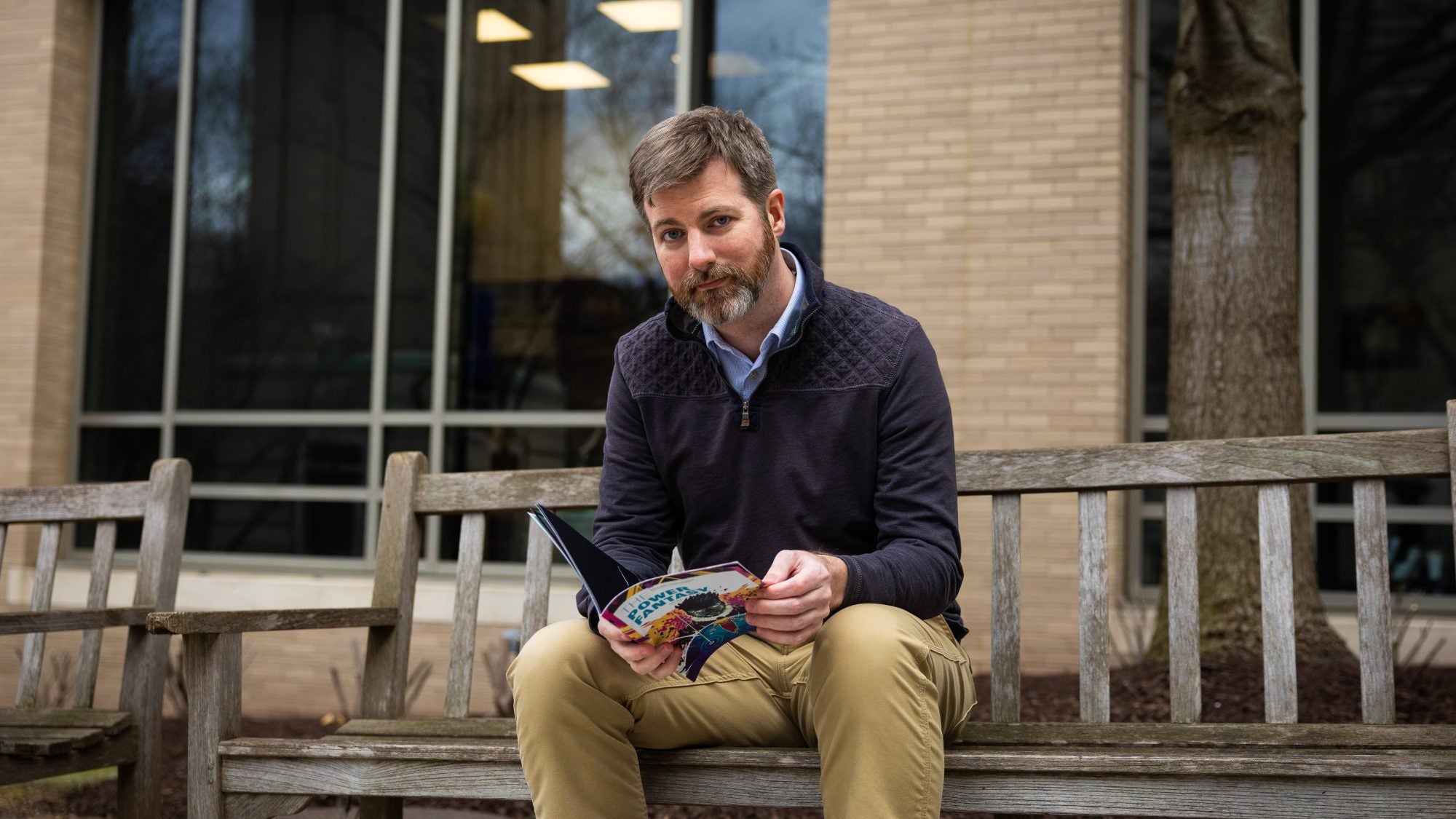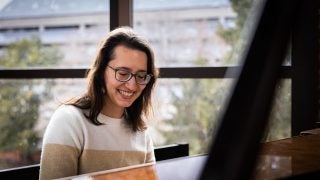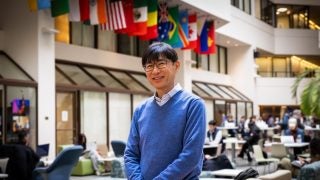This story is part of Georgetown Faces, a storytelling series that celebrates the beloved figures, unsung heroes and dedicated Hoyas who make our campus special.
Trent Kennedy was a toddler the first time he visited Georgetown.
Both of his parents worked in higher education — his father worked as a librarian at Georgetown Law.
After earning his law degree from the University of Minnesota, Kennedy followed in his parents’ footsteps when he worked for two years at the University of California, Davis, in student conduct. In 2016, Kennedy joined the student affairs team at Georgetown Law. 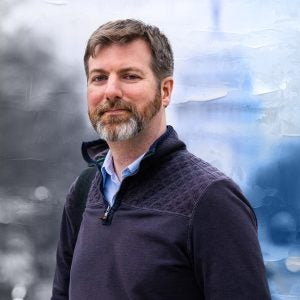
Today, Kennedy is a senior institutional research analyst for the Office of Assessment and Decision Support and provides data analytics for Georgetown Law and Georgetown University in Qatar. In his role, Kennedy uses data to answer big questions, from gauging the satisfaction of law students in an annual survey to modeling the value of midterm grades in predicting future success.
“It’s about what we want to do and how we can do it better. When I talk to people about it, I like to say that we measure this because it matters, and if you don’t feel like your work matters, let’s talk,” Kennedy said.
When Kennedy isn’t combing through datasets for work, he compiles data for his collection of books. A comic book aficionado, Kennedy loses himself in the tales of superheroes and imaginative science fiction. He’s also a regular at the annual pop culture convention Awesome Con in DC.
Get to know Kennedy, his love for big data and the time when a CIA officer taught him about spycraft through a popular role-playing game.
My first time at Georgetown: I wasn’t even in preschool yet. People always ask me where I grew up, and the answer is New York, Maryland, Missouri, Arizona and Michigan. I come from an academic family. Both my parents were faculty or academic librarians hunting for tenure, so my first time at Georgetown was when my father was head of reference at Georgetown Law. I don’t remember any of it. I see pictures, and apparently I was a reasonably cute baby.
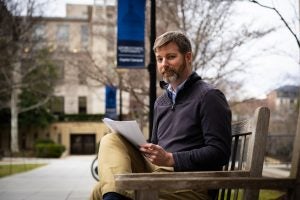 Why I loved working in higher education: I grew up around universities and university libraries, and so I saw the good that they did. But I also saw the complex pieces of how students got access or didn’t get access and how faculty were positioned vis-a-vis staff and students. It made for a rich environment to think about, and it made sense as a place where I would want to spend my career. I was interested in what was happening around me, the way students were engaging with big questions, the way universities were structured, and so I decided I wanted to do that for my life, and now I am.
Why I loved working in higher education: I grew up around universities and university libraries, and so I saw the good that they did. But I also saw the complex pieces of how students got access or didn’t get access and how faculty were positioned vis-a-vis staff and students. It made for a rich environment to think about, and it made sense as a place where I would want to spend my career. I was interested in what was happening around me, the way students were engaging with big questions, the way universities were structured, and so I decided I wanted to do that for my life, and now I am.
How I started my career at Georgetown: I went to grad school, went to law school in Minnesota, and then decided that even with a law degree in hand, I still cared about higher education. I still cared about students, so I went into student affairs. At UC Davis, I was working in student housing when a posting came through my inbox for on-campus housing at Georgetown Law, specifically the Gewirz Student Center. It was a chance to do law student affairs work, the type of work I wanted with a population that I really wanted to serve. Part of it was the institutional direction, the mission, the values, the things that get turned into decorations around campus to be woven into life on a regular basis. It was exciting to think about working someplace that knew how it wanted to make the world better and that wanted to sustain that commitment.
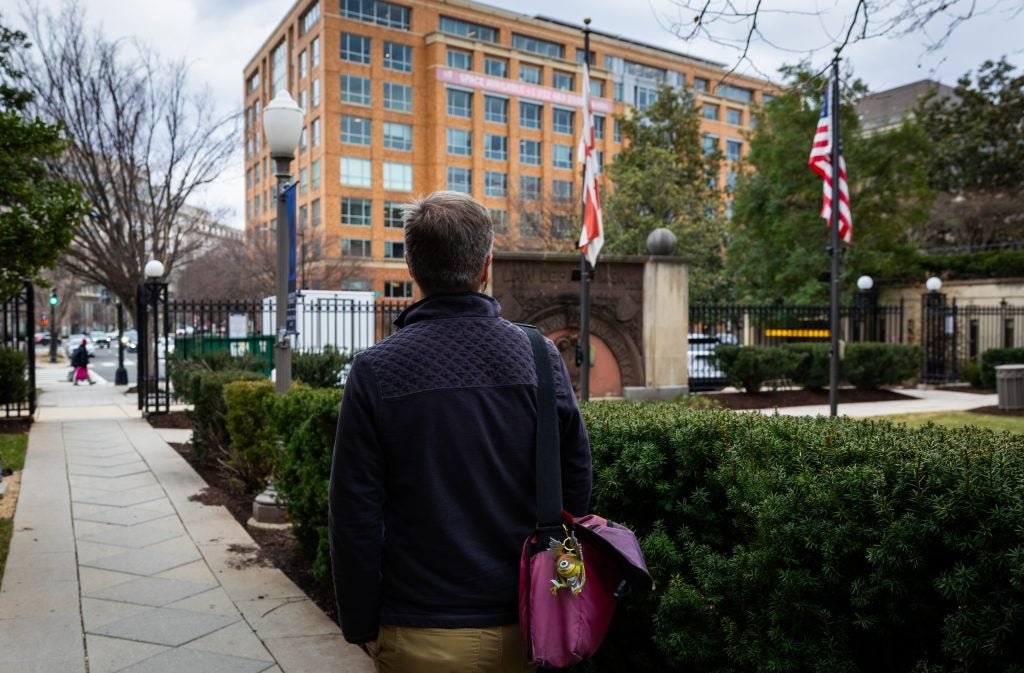
Why I pivoted away from student affairs: A few years ago, I made a pivot into institutional research. What I do now makes sense to some people and is a little baffling to others. When I first learned about institutional research, I had a professor who was adamant that the first answer to every institutional research question is, ‘It depends.’ On the other side, the first answer to every legal question is, ‘It depends.’ The congruence between those I thought was funny and fitting. It’s a lot of structured thinking, a lot of talking to people to figure out what they really mean or what really happened or what’s driving their request.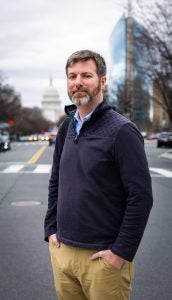
Why I love data: The exciting thing about data in higher education is that it gives us different ways of seeing life at the university. Different ways of seeing where students show up, where faculty show up, where research happens, the impact that research has, all of that is condensed and contained in some of our data. It’s hard to see individually, but when you pull out some of that data from those spreadsheets, from those databases, you can see patterns and practices and flows that are part of the university writ large that are otherwise kind of invisible. There’s a lot of beauty in what happens here that’s revealed in aggregate that you can’t always see from where you’re standing. We should be measuring the things that matter, and we should be measuring them because they matter, and that’s what guides me through this process.
The project I’m most proud of: After the pandemic, we restarted the graduating JD student survey. Before, it was really long, and the data coming in from it wasn’t being used for much. I’m proud of some work we did to reboot it and focus on the law school’s institutional learning outcomes, to measure those and have students see that part of their experience. We get to look at the things the institution says matter for each of our students, and we can look at how to do them better. That sort of mission-oriented improvement work is generally what I’m most excited about and most proud of.
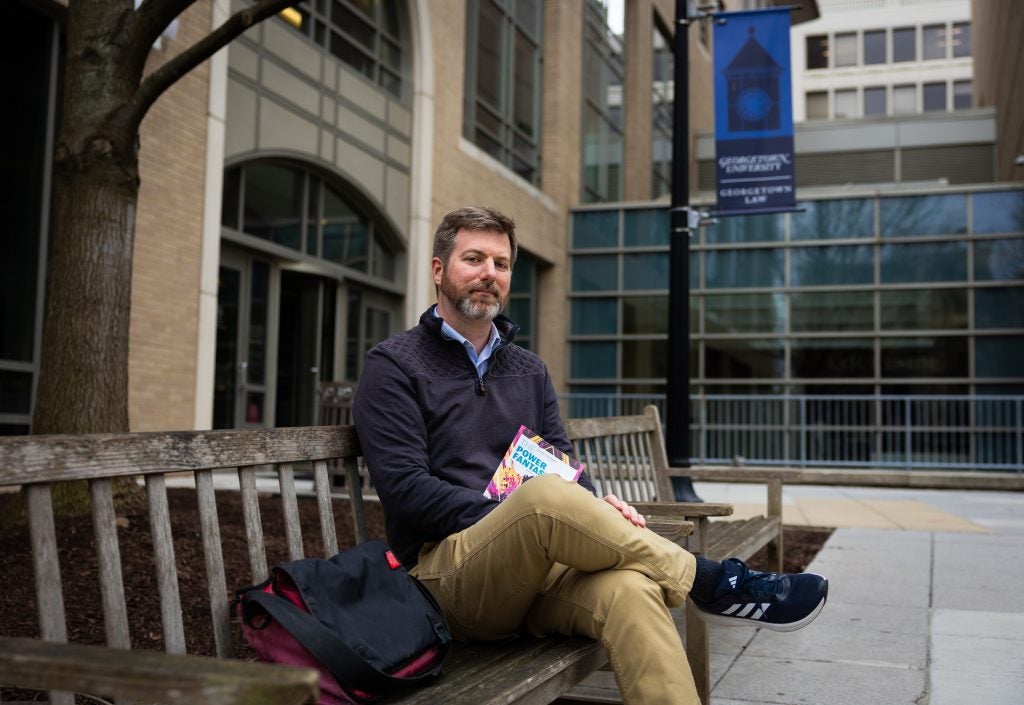
My comic book obsession: I’m a giant nerd, which is not surprising when you work in data analytics. I think the first comic book I owned was an X-Men book where they’re fighting the Brood. There’s Wolverine and Cyclops fighting this giant bug monster on the cover, and it was the coolest thing. I wanted to read that story, and ever since then, I’ve been excited about interesting stories with big ideas. I have a pull list at Fantom Comics, so every month or week, there are new things for me to read. I’m a huge fan of Awesome Con, which is DC’s comic book convention.
Why DC is a great place to be a comic book nerd: I’ve never been able to explain this to people properly, but I usually tell them [Awesome Con] is very DC. I had someone from the CIA teach tradecraft through Dungeons and Dragons. It was only about two hours, so I didn’t become a spy in the process. What can we do in fifth edition Dungeons and Dragons? We’re going to stat out the monsters, we’re going to plot everything. We’re going to do a write-up on paper and then rub coffee grounds on it so it looks like an aging scroll. I don’t think you can do that in any other city, so this is a great place to be a nerd.
The comic book niche I lose myself in: I would say comics with ideas, concepts and stories to tell, not just those that follow characters. I’m most drawn to things like Jonathan Hickman’s work, which is a lot of high-concept sci-fi. Kieron Gillen, who did some work on X-Men, now runs a title called The PowerFantasy, which is about what the world would be like if there were six people who had powers — magic, mutants, telepaths or something like that — that could change the world in an instant. What happens geopolitically? How do those six people relate to each other? When are they friends? When are they enemies?
My book collection: The most important piece of furniture in my house is a bookcase, and they are pretty much always full. The advantage of being the child of two librarians is that as much as I love universities, I love reading even more, and there are always good things to read.
